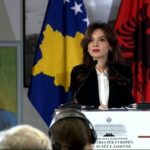French President Macron honored Chancellor Merkel with the highest French decoration. Intense communication between the two leaders enabled a big step for the EU, writes Auron Dodi.
The Elysee Palace called the decoration to Merkel a sign of “solid Franco-German friendship”. In fact he is a special appreciation. With the Grand Cross of the Legion of Honor, France has so far honored only two German chancellors: Konrad Adenauer after World War II, and Willy Brandtin in the 1970s. With maximum appreciation for Chancellor Merkel, France recognizes the fact that the Merkel-Macron era marks one step ahead, for the EU. This is what people close to President Macron told the German media.
As the greatest achievement in bilateral cooperation, the French appreciate the approval of the billion-dollar Reconstruction Fund for the Covid pandemic.
With it the EU took on joint debts for the first time.
The agreement for Germany Ursula von der Leyen to become President of the European Commission and Frenchwoman Christine Lagarde for President of the European Central Bank is seen as another bilateral success. And third, the Aachen Treaty of Friendship reconceptualized, for our era, German-French cooperation. These are crucial achievements for the stability of the EU.
Macron’s sincere and unexpected statements
At the special reception that Emmanuel Macroni organized on Wednesday (03.04.2021) in farewell to Merkel at the picturesque and historic place Beaune, near Dijon, in Burgundy, he expressed himself with unexpected sincere and self-critical words. “Thank you for teaching me so much,” he told Chancellor Merkel. “Thank you for accepting this impetuous new president, who wanted to change a lot.”
Regarding their differences of opinion, Macron told Merkel that “you accepted my energy and, from time to time, certainly my arrogance, with kindness and wisdom, and so I learned. Thank you for your patience and prudence with me. “
President Macron paid tribute to incumbent Chancellor Merkel at the farewell ceremony. While in the local French newspapers this week the word gratitude prevailed. “Exciting and longing farewell”, “a historic day of thanksgiving”, French newspapers wrote on Wednesday, among others.
Merkel and the French presidents
Merkel’s personal rapprochement with France took time. Growing up in the GDR, it was natural that Angela Merkel did not feel for neighboring France the closeness felt by West Germans. “France was far, far away from the GDR, we knew Poland better,” she said at a meeting with Macron in Beaune.
She visited the Elysee Palace, however, at the beginning of her political career, in 1990, when she accompanied (as Deputy Spokeswoman) the last Prime Minister of the GDR, Lothar de Maiziere.
On the other hand, the German relationship with France, the French have traditionally seen the same as the German relationship with Europe. In this context one can understand the statement of the well-known French political scientist of German origin, Alfred Grosser a few years ago, that he was not sure how committed to Europe Merkel really was. This is how this week’s statement by Macron’s former adviser Clemens Beaune to the Frankfurter Allgemeine Zeitung states that with Macron Merkel achieved her European maturity.
The fact that French presidents have traditionally demanded from their most powerful neighbor Germany, on behalf of Europe, rapprochement with French positions, is overlooked in these comments.
Merkel has always been aware of the importance of continuing deep cooperation with France. From the first day of her work as chancellor, in 2005, Angela Merkel visited Paris.
But the relationship with the first French president he faced, Jacques Chirac, did not gain momentum. Previously befriended by former Chancellor Gerhard Schröder and after the failure of the referendum on the European constitution in France, Chirac did not seem to take his relationship with Merkel seriously. The French press at the time compared Merkel’s 2005 visit to Paris to the “allure of a Trabanti” (GDR uncomfortable car).
Merkel’s relationship with the next president, Nicolas Sarkozy, only came closer in 2008, when the two had to work together on the Euro financial crisis. For Europe’s financial rescue, Sarkozy also called for a joint EU rescue fund. But Merkel opposed it. Each eurozone country then set up its own rescue fund. Sarkozy had to accept the cooperation that Merkel offered to him within the EU. Soon there was even talk of “Merkozy”, or as the Italian Romano Prodi put it then, “the matter has come where Merkel makes the decisions, while Sarkozy comes out announcing them”.
The relationship with the other French president, François Hollande, was more harmonious than with Sarkozy. Hollande even expressed admiration for Merkel in the 2015 refugee crisis. He called Merkel a savior of Europe and a humanitarian model.
Not always easy Merkel-Macron relationship
Emmanuel Macroni decided as soon as he came to power, in 2017, with youthful enthusiasm, to convince Germany of his visions. Unlike other French presidents, who initially invested in cooperation with Italy (to once conclude that “with Italy everything starts with enthusiasm, but further work stalls”), Macroni focused entirely on Germany.
Macroni paid his first post-election visit to Germany. In his closest government team he appointed some good connoisseurs of Germany. In parallel, he confronted Germany with his visions for Europe, in the famous speech he gave in September 2017, at the Sorbonne University.
Macroni has admitted that the theses of this speech of his were not entirely new. What he has not asserted is that, in essence, his speech at the Sorbonne laid out in attractive terms the constant French demand for a redistribution of wealth in Europe. The quiet analysis of the speech in Germany showed that Macroni was following, with a European rhetoric, further the French imaginations for the development of Europe. Macroni demanded a joint budget for the Eurozone with a European finance minister. This also meant narrowing Germany’s financial sovereignty. Germany’s fiscal policy would depend on rotating European ministers. This would be another step towards the redistribution of wealth in Europe.
Macroni further sought a more autonomous Europe, especially from a military point of view. He did this by being aware of the French military tradition of intervening militarily in the world and that France was the EU’s only atomic power. Germany, on the other hand, remains committed to cooperating with the United States, despite recent developments in the United States.
Providing the same content with attractive formulations, made Merkel silently wait for Macron’s visions for Europe. The six-month timeframe for forming the new German government was at the time an additional factor in Germany’s non-response.
In Germany it has been concluded that Macroni has often pursued purely French interests when using European narratives. Apparent here is his desire to feed the French the idea of a France-inspired Europe outside American hegemony.
The conceptual differences of the Germans with the French continued in the following years. Macron’s goal is to achieve the status of a great power for France. Germany, on the other hand, demands more responsibility for the multilateral, world order. Macroni defends in foreign policy the “realist” camp: enabling the state to intervene effectively in public life Germany defends “liberal” attitudes: order and multilateral cooperation.
Relations between Chancellor Merkel and President Macron have not always been easy. The media quote that at a dinner a few years ago, Merkel told Macron that in international meetings I only have to deal with collecting the pieces of damage you do. Macroni, meanwhile, reportedly replied that everything he said was tacitly awaited by the German side.
Intense communication enabled the big step
These divergences did not, however, deter intensive communication with Paris, in Merkel’s last term. Although in the German media Macron’s statements about Europe were considered “intellectual Trumpism” , this did not affect the intensity of Berlin-Paris communication.
Keeping intensive communication open was a crucial factor that enabled the big step in the pandemic crisis: the acceptance by Germany and some Nordic countries for the first time of borrowing jointly from the EU. Some of these debts with the Billion Pandemic Reconstruction Fund are given as grants to needy countries, mainly in southern Europe. When the pandemic threatened the disintegration of the EU because of the risk of state bankruptcy, Chancellor Merkel committed herself with all her might to the benefit of Europe – and to the French proposals.
The relationship with the four French presidents, the relationship between Germany and France, Chancellor Merkel summed up on Wednesday in Beaune with the words “… we have the same value system, but the first ideas have often been different.” It has always been achieved that different inspirations come together “to create something more than what we have only thought”.
As Macroni put it, “I learned that finding a balance between our two countries, between different temperaments and histories, means we can persuade other states to work with us.”
The new German government with its own punctuation marks
The departure of Merkel as chancellor and from the political scene brings a natural disruption to the flow of cooperation. The new German government that is expected to be formed will set its sights.
Olaf Scholz, the current Social Democrat Minister of Finance of Germany and probably the next Chancellor of Germany, has worked closely with France especially in recent years. France was the first country he visited in the election campaign.
But Scholz will have FDP liberal partners in government. They are highly critical of France’s desire to widen the acceptable EU deficit threshold. And especially to the French request to turn the common EU debts into a permanent instrument. The other government partner, the Alliance90 / Greens, is critical of rising military spending and nuclear power, a favorite topic for the French. Compromises between Germany and France will be sought again – but likely, as so far, will be found./DW












